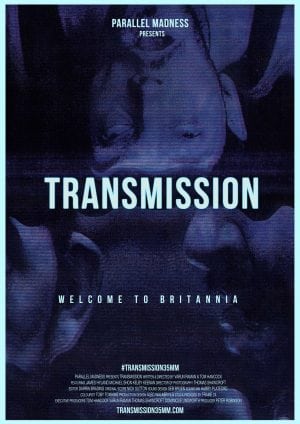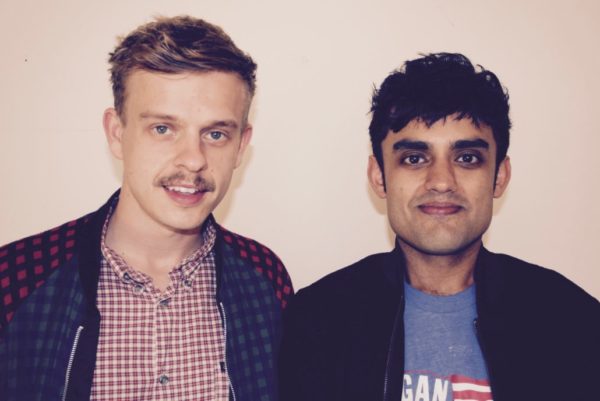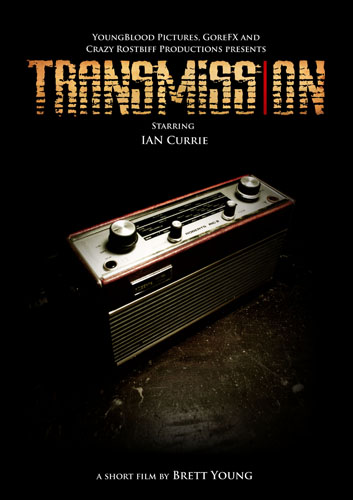Transmission (2017)
Directed by: Parallel Madness, Tom Hancock, Varun Raman
Written by: Parallel Madness, Tom Hancock, Varun Raman
Starring: James Hyland, Kelby Keenan, Michael Shon

TRANSMISSION
Directed by Parallel Madness
Nowadays, news headlines about the rise of populist nationalism, despots, isolationism, terrorism and the background threat of nuclear war increasingly resemble the prologue to a dystopian novel. As such, today’s political climate offers fodder for horror movie makers everywhere. One stand-out example is Transmission: a post Brexit/ Trump head-fuck about torture, totalitarianism and just a smidge of hope. Having reviewed it last year, I’m a big fan and reckon it’s the sort of film our readers will love. You can watch it by clicking below. It’s around 20 minutes long, and is best experienced with a good set of headphones in a dark room. Go on, I’ll wait. But I’ll warn you – it’s intense, and capable of bringing down even the most jovial of moods.
So that was a great, if grueling, watch right? Bet it’s left you wanting to know more about the minds behind it. Well as another treat to our readers, to celebrate its release HorrorCultFilms got in touch with the dynamic duo Tom Hancock and Varun Raman aka Parallel Madness. Among other things we touch upon shooting on a shoestring, the refugee crisis and accountability. Note this interview took the form of an email exchange, and all answers came from both of them. So goes their collaborative nature.

Can you tell me about how Parallel Madness started?
We met at the University of Manchester in 2008. Tom was in his second year studying Philosophy and Politics. Varun was in his first year studying Physics. We had a mutual friend and then bumped into each other at a student radio station event in freshers’ week. We then decided to do a radio show together and things went from there.
I understand you moved from radio to film – what did you see as the benefits of this medium for your vision?
We only really went into radio as we felt a need to just work on something that had a semblance of creativity outside of our courses. There was no real film society with proper equipment so radio was the next best bet. It was a great learning curve and pre-cursor to filmmaking. We had to structure a show with segments and meet a weekly deadline to deliver a show. We just got a bit fed up of trying to fill dead air and come up with content for content’s sake. We wanted to work on something more meaningful. Film as a medium has it all, every aspect of art. It’s hard to beat really.
While this has elements of other genres, is making horror something you’ve always been interested in?
Genres are weird because they’re like moods. It depends what mood we’re in at the time and what we want to say. We appreciate all genres. They have their purpose. But horror was the one that screamed out to us for TRANSMISSION, although it’s not explicitly horror either. There’s a bit of sci-fi and Lynchian surrealism thrown in there too. We would love to make an all-out horror though.
What were the origins of Transmission?
TRANSMISSION was written back in 2015, during the height of the refugee crisis as a warning against the anticipated rise in British nationalism, which had been catalyzed by financial austerity and growing hysteria surrounding terrorism. We suspected people would sacrifice their freedoms on the basis of rousing narratives rather than facts. It’s easier to blame sections of society than to hold the elite accountable. And then Brexit happened whilst we were in the middle of shooting the film, followed by Trump.
As a duo, do you have particular processes in place for avoiding/ defusing any strong artistic differences?
Both: We tend to have very similar sensibilities and tastes so that helps. We talk over things thoroughly in the writing and pre-production processes, whether it’s shot-listing, the aesthetic, sound design or the score. The most important thing to figure out early on is the tone and the rhythm of the film. Then when it comes to being on set, it’s a scramble to get things done, so we trust each other to stick to the brief we set out. And as a rule, we try and make sure something is always happening on screen and moving forward, even if it is slow burn.
Did this sense of collaboration extend to the actors and other crew members?
We collaborated extensively with the DOP Thomas Shawcroft, discussing everything from shot-lists right through to the grade. He shared our obsession with getting the right aesthetic and we carried out all sorts of tests to get the look we wanted. Thomas was the best DOP we could have worked with on the project. We learned a lot about filmmaking from working with him. We also made sure we had people on board, especially on post, as early as possible, including the score and sound design. We would discuss things extensively to ensure we were all on the same page.
With the actors, we carried out rehearsals, starting with basic read-throughs and blocking, then moved onto the more interesting bits. To allow the actors to create shared histories for their characters, we devised scenarios of their past interactions. The actors would improv for up to 30 minutes for each scenario. And sometimes, the improv sessions would alter some background details we may have decided on before. The characters were very much handed over to the actors in this process.
For the location shots, was it tightly story boarded? Or do you lean towards more of an improvised feel?
As it was our first real stab at a high production short, we wanted to be very prepared for when it came to the shoot. It was tightly storyboarded. We shot-listed every scene with feedback from our DOP Thomas Shawcroft. Then storyboard artist, Adam Davis drew the boards. Once we got the boards back, Varun made an animatic of the whole film. We also created a separate document with each board, and the extract of the script underneath to show us how long the shot ran for.
Of course, in terms of scheduling, some shots and even scenes had to be thrown out the window, but as the film on paper is a potential continuity nightmare, it was very handy to be that prepared. We knew what would work and what wouldn’t when taking shots out of the schedule.
Although the scale is very small, the scope of the film is anything but. How did you find funding/ shooting it on a limited budget? I’ve seen it took 18 months
It’s very hard because you’re asking for favours everywhere. Things would often fall through. And some things would have to be sacrificed. So patience was key in terms of getting it over the line. We’ve tried to make a lot of films this way, before this one and they’ve died along normally due to over-reaching. So it was very important this one was a two-hander, set in mainly two locations, and we challenged ourselves to make it as cinematic as possible.
Much of the power of Transmission comes from its stellar soundtrack from Nick Sutton. How did he capture the feel you had been going for?
Nick just knew what to do. We knew from the work he did for Ian Pons Jewell that he’d be right at home with TRANSMISSION. His taste is very similar to ours so whenever we mentioned references, he was already ahead of us and knew what we wanted. The process was incredibly easy and fluid with Nick. His full extended score that was released earlier this year is testament to that.
Although it’s not explicitly referred to in the script, it is hard not to see Transmission in the light of Brexit. Is this a state of the nation film to you?
The world just seems to be heading that way at the moment. With the latest example being Bolsonaro’s election in Brazil. There’s an environmental shit storm coming, and the elite seem like they want to be as rich as possible for it when it happens. And if they keep the poor distracted and hating each other up until that point, then the super rich and super connected will be just fine. Divide and rule has always worked. It’s sad how easy it seems.
By now it has shown in many festivals – have you noted different responses to it outside the UK?
It seems to have been embraced far more outside of the UK. Outsider perspectives are probably more willing to embrace it, because the conversation is not as difficult for them, as it is for us. It was probably something that a lot of British people weren’t yet ready to confront at the time of its festival run. But our cinema is generally heavily weighted in favour of the establishment. We seem to be symptom-obsessed and not all that bothered with the causes of things, because that would mean the people responsible for society’s ills would actually have to be held accountable. The Canadian’s and French really seemed to dig it, and even saw the dark humour.
Are you optimistic about the future?
On our country’s current trajectory, we would say no. But things can change. World politics is generally in a confused dangerous place right now. The conversation has shifted to a place of absurdity when we really should be worrying about the climate. That’s something we won’t be able to avoid.
What do you intend to work on next?
We’ve written a comedy feature called QUEEN + CoUNTRY for ourselves to direct. We don’t mention Brexit in it, but it’s much more explicitly about it. It’s a lot more straightforward than TRANSMISSION, but the elements of darkness, absurdity and surrealism are there. We would like to get the ball rolling on that project as soon as possible.
We’ve just written a sci-fi pilot and series bible for the Berlinale Crystal Bear winners, Blue Shadows Films (Butterfly Kisses). They’re looking to partner up with US-based production companies. We also have a horror script in the works, also for ourselves to direct. We will get writing that in the new year.
Transmission was reviewed here, and the soundtrack was covered here.




Be the first to comment